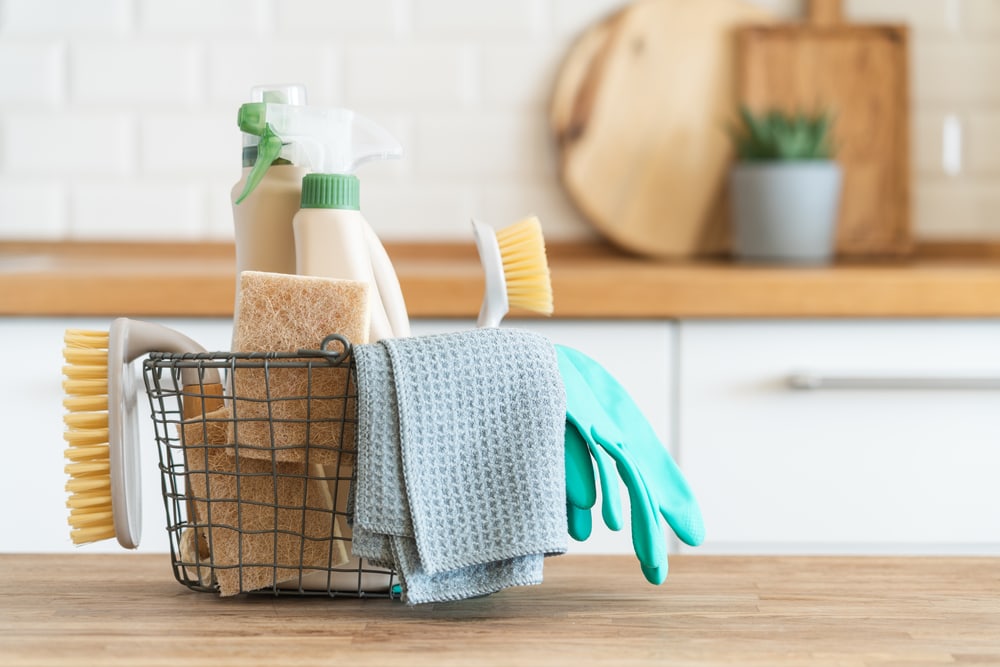What to Expect During a Home Appraisal | Safety Equipment | Appliances and Mechanical Systems | Curb Appeal | Repairs | Damage in Your Attic, Basement, or Garage | What to Clean | Documenting House History | Neighborhood Amenities | What To Do If Your Appraisal Is Low
A home appraisal is when an expert examines your property to estimate its value before listing your home, during escrow, and when you’re refinancing your home.
No matter the situation, you want your home to be valued as high as possible. Properly preparing your home for appraisal can mean an increase of buyers and a higher sale price — things that every seller wants.
According to the National Association of Realtors, 22% of delayed contract settlements are because of appraisal issues.
The same report found that appraisals during the winter of 2022 had lower values than the initial contract price in 24% of purchase contracts of REALTORS®, causing 7% of buyers to back out and the sale to fall through.
What does that mean? In simpler terms, getting your appraisal higher than your contract price can help to avoid your sale falling through.
If you’re refinancing, an appraisal determines the value of your home and how much equity you have to borrow against. Doing an appraisal first can help you avoid common pitfalls and price the home more accurately.
Our top tip for preparing for a home appraisal is to get a good realtor on your side as soon as possible. Having a trustworthy real estate agent walk you through prepping your house for appraisal can save you a lot of time, energy, and money.
What to Expect During a Home Appraisal
If you’re concerned about your appraisal, you’re not alone. In a 2022 survey by the Clever Data Center, 60% of sellers said they were somewhat or very concerned their home might not appraise for the purchase price.
Appraisals determine what a house is worth on the open market. It’s common practice for real estate transactions, whether buying, selling, or refinancing the property. Licensed or certified home appraisers perform the appraisal to assure the lender that they’re not handing over more money than the home is worth.
The appraiser will visit your home to do a walk-through and review the property. It typically takes one to three hours to do the on-site inspection.
However, you typically won’t receive the report right away. A Uniform Residential Appraisal Report usually arrives within a few days. Still, it could take up to a week or longer, depending on the appraiser’s schedule and the complexity of the property.
How to Prep for a Home Appraisal in 8 Steps
A higher appraisal amount can mean more money in your pocket. While you can’t change some things that influence the appraisal, like your location and the surrounding neighborhood, you’ll find that many things are within your control.
To maximize the time and money you put into preparing for the appraisal, you must know what not to fix when selling a house. Some projects don’t deliver a positive return on investment. But there are plenty of ways to prepare your home for a high appraisal.
1. Check Your Safety Equipment
The first step of preparing for an appraisal is to make sure your home’s necessary safety equipment is installed and in good working order. Here are some things to check for:
- Carbon monoxide alarms
- Fire extinguisher
- Home security alarm
- Smoke alarms
If you don’t have one already, get a fire extinguisher and place it under your kitchen sink.
2. Check Your Appliances and Mechanical Systems
Appliances and mechanical systems are a crucial part of the appraisal.
If there’s an appliance, heating element, or other system you haven’t used in a while, check to see how well it’s working. Then, if it needs repair, you can address that before the appraiser marks it as non-functioning on the report.
The appraiser will inspect appliances like:
- Dishwashers
- Garbage disposals
- Microwaves
- Ovens
- Ranges
- Refrigerators
- Washers and dryers
- Other major appliances
You’ll also want to check your home’s mechanical systems, including:
- Cooling
- Electrical
- Heating
- Plumbing
3. Increase the Curb Appeal
You could increase your home’s value by up to 7% by dressing up the view from the street, according to a joint study by the University of Texas at Arlington and the University of Alabama.
Before the appraisal, you could prepare for a better report by:
- Adding color with flowers
- Clearing ice and snow from walkways and driveways in winter
- Mowing the lawn
- Putting mulch in flower beds or around trees
- Removing clutter like toys, bikes, and yard tools
- Removing dead trees and plants
- Trimming overgrown trees and shrubbery
You should also check the quality of your fences, porches, and decks to make sure they’re structurally sound, and consider painting or replacing boards if they show signs of wear.
4. Address Needed Repairs and Deterioration
Next, walk through your house with a critical eye looking for damage that can seem unsafe or unsightly. For example, a loose floorboard can cause someone to trip and seriously injure themselves.
Anything that makes your home seem neglected can ultimately harm your appraisal. A home with potential hazards will become a red flag for an appraiser. So, use a critical eye to look for:
- Blocked gutters
- Cracks or damage to foundation, siding, windows, and doors
- Damage to weather stripping around doors and windows
- Excessive wear and tear on floors and walls
- Mold or mildew on or near showers and bathtubs
- Roof leaks
Taking the time to refinish a floor, reduce or remediate mold and mildew, or paint decades-old color on the walls can increase your home’s value.
5. Check for Damage in Your Attic, Basement, and Garage
Head into your attic, basement, and garage and carefully look for signs of water damage and infestations. Sniff around for any unpleasant odors. Appraisers may note any scent of mold or leakage.
Bring the vacuum, broom, and other cleaning supplies to give the areas a good once-over. For example, if you recently treated the house for an infestation, clean up any pest feces or dead pests.
6. Clean (Even Though You’re Not Required To)
You technically don’t have to clean your house before an appraisal, but cleanliness can work wonders to make your home appealing and therefore valuable. According to Realtor.com, smells, tidiness, and how a house feels can subconsciously influence appraisers.
Here’s a quick checklist of some things you should do to clean before an appraisal:
- Clean up appliances, like the microwave and refrigerator
- Dust all obvious surfaces
- Power-wash the deck, driveway, and walkway
- Vacuum
- Remove clutter
- Sweeping and mopping the floors
- Wipe down walls and doors
- Wash windows and mirrors
If you typically keep small kitchen appliances on the countertop, try packing them away for the appraisal. In the end, a clean, decluttered home looks newer and more attractive to appraisers and buyers.
7. List Recent Repairs and Upgrades
Keep an organized list or folder of all recent repairs and upgrades you’ve completed on your house. Appraisers are trained to recognize that you’ve done work, but they have no way to know how recently you did it unless you tell them.
Note upgrades and repairs, including:
- Bathroom/vanity renovations
- Countertop replacements
- Gutter replacements
- HVAC replacements
- New flooring
- New additions to the house
- Roof repairs or replacements
- Remodels (especially kitchens)
- Siding replacements
Letting your appraiser know you’ve invested in the upkeep and maintenance of your house will positively influence their opinion of your home’s value.
8. Note Neighborhood Amenities or Features
Lastly, when preparing your home for appraisal, inform the appraiser about the amenities or features of your neighborhood, including:
- Community centers
- Golf courses
- Libraries
- Local attractions
- Medical centers
- Museums
- Natural features
- Parks
- Pools
- Restaurants
- Schools
- Shopping centers
These factors can add value to your home. There’s a place for this information on the Uniform Residential Appraisal Report.
Even experienced local appraisers may not be familiar with your neighborhood or know the perks available in the area, so it’s good to let them know.
What To Do If Your Appraisal Is Low
Receiving an appraisal that is lower than expected is frustrating and disappointing, especially if it’s less than the buyer’s offer amount.
An appraisal gap can also limit how much a lender will finance for a new buyer and the amount you can access if you’re refinancing.
Unfortunately, appraisals fall below the expected value about 19% of the time, according to data from CoreLogic.
So, what can you do if your home appraisal is low? Here are a few steps you can take to resolve the situation:
- Accept a lower loan amount if you’re refinancing.
- Arrange for a second appraisal.
- Reduce the asking price of your house
- Review appraisal with your realtor to determine what proof would support a higher appraised value. Take their advice and address as many of the points as possible.
- Submit a reconsideration-of-value (ROV) request disputing the appraisal. You’ll need to provide documented evidence to support your claim.
With the housing market continuing to improve in many areas, a growing number of homeowners are beginning to refinance or sell their homes.
Even though you may be excited about being one step closer to making a new financial move, the process can be a little nerve-wracking. Remember there’s plenty you can do in advance of an appraisal to ensure that your home is as appealing as possible for potential buyers or lenders!
Recommended Reading
Frequently Asked Questions About Preparing for a Home Inspection
What should you clean before an appraisal?
Before a home appraisal, you should put away any clutter, wipe down any dirty surfaces (walls, doors, floors, mirrors, etc.), clean any appliances that are going to be examined, vacuum, and power-wash outdoor surfaces. Learn more ways to prepare for a home appraisal.
How do you get a high appraisal?
You can get a higher home appraisal by preparing beforehand and getting ahead of any possible issues the appraisal might uncover. Here are eight things to do to prepare for a home appraisal.
What negatively affects home appraisal?
Dirt and clutter negatively affect home appraisal, as do things like malfunctioning mechanical systems and appliances, infestations, mold, and water damage. Here are eight things to do to prepare for a home appraisal.
Does a messy house affect an appraisal?
A messy house can affect an appraisal negatively. Even though cleaning isn’t required, having a clean house that’s free of clutter will improve the appraiser’s opinion of the house, which means possibly increasing your home’s value. Learn how you should prep for a home appraisal.
What does an appraiser look for in a home?
An appraiser looks at safety equipment, mechanical systems and appliances, any potential infestations or water damage, the curb appeal of the house, recent updates and repairs, and any natural features or amenities nearby. Learn how you can prepare for a home inspection to make sure your home value is as high as possible.



